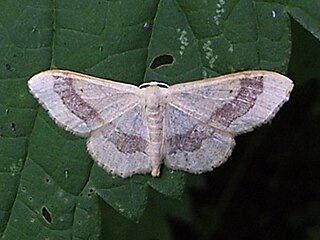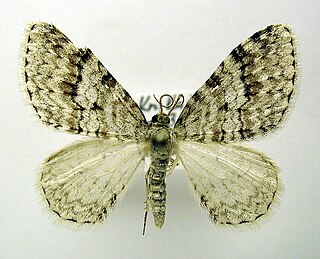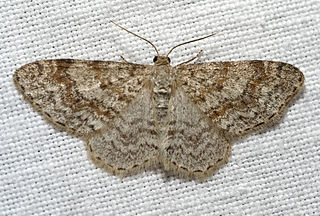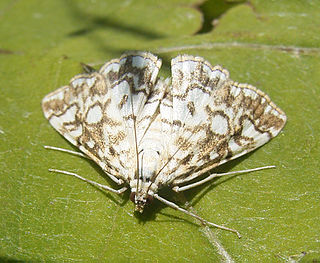
Pyraustinae is a large subfamily of the lepidopteran family Crambidae, the crambid snout moths. It currently includes over 1,400 species; most of them tropical but some found in temperate regions including both North America and Europe.

Idaea, sometimes called Hyriogona, is a large genus of geometer moths. It was erected by Georg Friedrich Treitschke in 1825. They are found nearly worldwide, with many native to the Mediterranean, the African savannas, and the deserts of western Asia.

Spilomelinae is a very species-rich subfamily of the lepidopteran family Crambidae, the crambid snout moths. With 4,132 described species in 340 genera worldwide, it is the most speciose group among pyraloids.

Udea is a genus of snout moths in the subfamily Spilomelinae of the family Crambidae. The genus was erected by Achille Guenée in 1845. The currently known 214 species are present on all continents except Antarctica. About 41 species are native to Hawaii.

Hydrelia is a genus of moths in the family Geometridae erected by Jacob Hübner in 1825.

Lomographa is a genus of moths in the family Geometridae. The genus was erected by Jacob Hübner in 1825.

Perizoma is a genus in the geometer moth family (Geometridae). It is the type genus of tribe Perizomini in subfamily Larentiinae. The tribe is considered monotypic by those who include the genera Gagitodes, Martania and Mesotype in Perizoma. Some other less closely related species formerly placed here are now elsewhere in the Larentiinae, e.g. in Entephria of the tribe Larentiini.

Scopula is a genus of moths in the family Geometridae described by Franz von Paula Schrank in 1802.

Venusia is a genus of moths in the family Geometridae erected by John Curtis in 1839.

Asthenini is a tribe of geometer moths under subfamily Larentiinae first described by Warren in 1893. The tribe has been combined with Eupitheciini in the past, most notably by Jeremy Daniel Holloway in his work The Moths of Borneo.

Melanthiini is a tribe of geometer moths under subfamily Larentiinae. The tribe was described by Philogène Auguste Joseph Duponchel in 1845.

Eupitheciini is a tribe of geometer moths under subfamily Larentiinae, often referred to as pugs. The tribe was described by Tutt in 1896.

The Phycitini are a tribe of moths of the family Pyralidae.

Acentropinae is a fairly small subfamily of the lepidopteran family Crambidae, the crambid snout moths. Species of this subfamily are exclusively found in wetlands and aquatic habitats.

Glaphyriinae is a subfamily of the lepidopteran family Crambidae. It was described by William Trowbridge Merrifield Forbes in 1923. The subfamily currently comprises 509 species in 75 genera.















